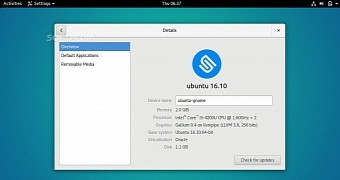As part of today's Ubuntu 16.10 (Yakkety Yak) release, the Ubuntu GNOME 16.10 operating system hits the streets with numerous new features and improvements.
A lot of things have changed since Ubuntu GNOME 16.04 LTS (Xenial Xerus), and the Ubuntu GNOME 16.10 release is a worthy upgrade for those who love the GNOME 3 desktop environment, especially because the distro now ships with numerous up-to-date components from both the GNOME 3.20 and GNOME 3.22 application stacks.
"Ubuntu GNOME 16.10 proudly includes GNOME 3.20," reads the official announcement. "Many apps have been updated to their GNOME 3.22 versions. The core system (GTK+, gnome-shell, gnome-control-center and nautilus) is still at 3.20. Many GNOME apps now have a Keyboard Shortcuts popup available in the app menu."
Here's what's new in Ubuntu GNOME 16.10
Just like Ubuntu 16.10 Desktop, Ubuntu GNOME 16.10 uses the Nautilus 3.20 file manager, but you'll be able to use the recently released GNOME Photos 3.22 app, which supports Google Photos sharing and non-destructive editing, as well as Totem (Videos) 3.22 with support for adjusting the playback speed via the play menu.
Moreover, the GNOME Books 3.22 app is included and provides initial support for the EPUB format, along with the latest GNOME Maps 3.22, Disk Usage Analyzer (Baobab) 3.22, and GNOME Characters 3.22. The GNOME Initial Setup utility is also installed by default to help you better and faster configure your Ubuntu GNOME 16.10 session.
Of course, you'll also be able to use the LibreOffice 5.2 office suite and Mozilla Firefox 49.0 web browser with the GTK+ 3 technologies, there's an experimental Wayland session, which you can access from the login screen (GNOME on Wayland), and it looks like the Empathy IM (Instant Messanger) has been removed from the default install.
Under the hood, Ubuntu GNOME 16.10 (Yakkety Yak) is powered by Linux kernel 4.8, uses a GPG (GNU Privacy Guard) binary provided by GnuPG 2, and systemd for user sessions. For the first time, Ubuntu GNOME doesn't include any Qt libraries by default. Download Ubuntu GNOME 16.10 for 64- and 32-bit PCs right now.

 14 DAY TRIAL //
14 DAY TRIAL //